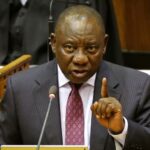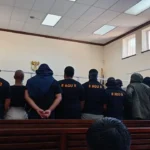Former President Jacob Zuma has thrown the African National Congress (ANC) into disarray by challenging their negotiation strategy. Zuma, who now leads the uMkhonto weSizwe (MK) Party, asserts that the ANC cannot seek to negotiate while simultaneously holding onto non-negotiables. This bold statement has ignited a fiery debate within the political landscape, exposing underlying tensions and raising questions about the ANC's unity.
Zuma's remarks come amidst rumours that the MK Party would be open to working with the ANC if current President Cyril Ramaphosa were to be removed from power. The ANC promptly dismissed these speculations, declaring Ramaphosa a non-negotiable figure and refusing to entertain any conditions that demand his removal. However, Zuma firmly believes that this approach is misguided and counterproductive in the art of negotiation.
Speaking at his Nkandla residence in KwaZulu-Natal, Zuma expressed his concerns over the ANC's approach, stating, "Can't say you want to negotiate but not about our president. What is that? You don't want to negotiate, because if you want to negotiate, then you negotiate. If those issues arise in the process, then we discuss."
While Zuma's daughter, Duduzile, has already made it clear to the media that the MK Party will not collaborate with an ANC led by Ramaphosa, her father has chosen not to disclose the specific demands put forth to the ANC. This air of mystery surrounding their negotiation points has left political analysts and observers intrigued, wondering what lies at the heart of the MK Party's demands.
Adding to the complexity of the situation, Zuma hinted at potential legal challenges to the recent election results. He revealed that his party, along with several others, are considering taking their grievances to the courts, further fueling the already intense political environment. As the legal battle takes shape, Zuma is also exploring strategic avenues to make his party's presence felt within the hallowed halls of Parliament.
Zuma explained, "If there is no quorum, that Parliament collapses. It collapses. They can't go there with members who are not there, that's not Parliament."
Considering the leverage he holds, Zuma emphasized the potential impact of a lack of quorum in Parliament. "If there is no quorum, that Parliament collapses. It collapses. They can't go there with members who are not there, that's not Parliament," he asserted. This revelation underscores the delicate balance of power within the political sphere and raises questions about the stability of the newly formed government.
In the coming weeks, Zuma and his MK Party members, including elected Members of Parliament, are expected to be sworn into office, setting the stage for a potentially contentious and transformative period in South African politics. The dynamics within Parliament will undoubtedly be closely watched, as the presence of the MK Party adds a new layer of intrigue and uncertainty to the already complex political landscape.
As the ANC grapples with internal divisions and the MK Party asserts its influence, South Africa finds itself at a critical juncture. The nation eagerly awaits further developments, curious to see how negotiations, legal challenges, and parliamentary dynamics unfold. The future of the ANC, the role of Zuma's MK Party, and the broader implications for the country's political landscape hang in the balance, making this a gripping saga that will undoubtedly shape the course of South African history.

Follow Us on Twitter











